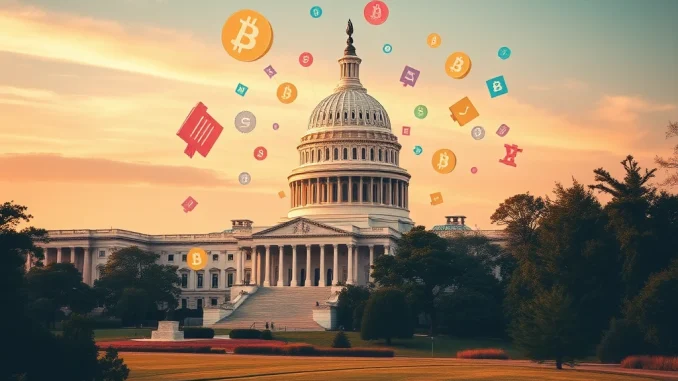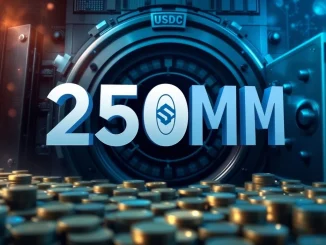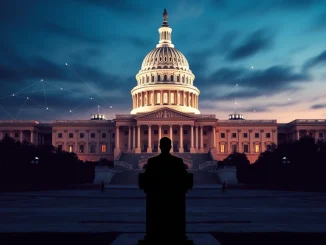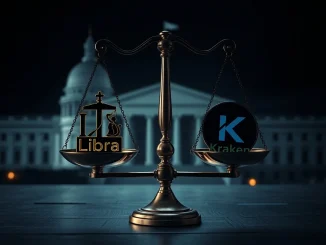
Big news from Capitol Hill impacting the future of digital currency! The path forward for US stablecoin regulation just hit a major roadblock. A group of powerful US Democrats has signaled they won’t support the current version of a key piece of legislation, citing significant concerns. This pushback highlights the ongoing challenges in bringing clear rules to the crypto space.
Why Are Democrats Opposing the Stablecoin Bill?
Nine Senate Democrats, including Arizona’s Senator Ruben Gallego, have reportedly stated they cannot back the current draft of the Guiding and Establishing National Innovation for U.S. Stablecoins of 2025 (GENIUS Act). While acknowledging the necessity for bipartisan regulation in the stablecoin sector, their collective statement points to several critical, unresolved issues within the bill.
Their primary concerns revolve around potential regulatory gaps that could pose risks. These include:
- Insufficient provisions for anti-money laundering (AML) controls.
- Lack of clarity or control regarding foreign stablecoin issuers operating within the US market.
- Potential implications for national security.
- Risks to the integrity and stability of the broader financial system.
These points suggest that while there’s agreement on the *need* for a stablecoin bill, there’s fundamental disagreement on whether the current GENIUS Act adequately addresses the potential downsides and risks associated with widespread stablecoin adoption.
The Role of Trump’s Crypto Connections
Adding another layer of complexity to the debate is the timing of this Democratic opposition, which appears to coincide with recent headlines involving former President Donald Trump and his growing ties to the crypto world. This connection seems to be fueling some of the hesitance regarding the Democrats stablecoin stance.
Specifically, two recent developments have raised eyebrows:
- Reports of Trump planning a dinner event specifically for top holders of his TRUMP memecoin.
- News that Abu Dhabi-based firm MGX intends to use a Trump-backed stablecoin, USD1, in a significant investment deal involving Binance.
According to reports, these moves could potentially benefit Trump financially, possibly to the tune of hundreds of millions of dollars. This potential personal financial gain linked to crypto activities is reportedly a source of concern among some lawmakers.
Could Trump’s Crypto Ties Stall Progress?
The intersection of political figures and the rapidly evolving crypto market is always complex, and this situation is no different. One source speaking to CoinDesk reportedly expressed worry that the focus on Trump crypto connections could inadvertently slow down or even halt progress on the crucial stablecoin bill.
The concern is that if the stablecoin legislation gets bogged down in political controversy related to individuals, it could potentially derail broader efforts to establish clear market structure legislation for the entire crypto industry. This highlights the delicate balance lawmakers face in regulating a new technology while navigating political landscapes.
What Does This Mean for US Stablecoin Regulation?
The withholding of support from these key Democrats signals that the path to enacting comprehensive US stablecoin regulation through the GENIUS Act is far from clear. The bill will likely require significant amendments to address the stated regulatory gaps and potentially mitigate concerns related to political influence or conflicts of interest.
For the crypto industry, this means continued uncertainty regarding stablecoin frameworks. While the desire for regulation is bipartisan, the specifics remain a point of contention, influenced by both technical regulatory details and the broader political climate.
In Conclusion
The opposition from Senate Democrats to the current GENIUS Act underscores the challenges in crafting effective and widely supported US stablecoin regulation. Citing critical gaps in areas like AML and national security, their concerns are compounded by recent reports linking former President Trump to potentially lucrative crypto ventures. This development not only puts the stablecoin bill’s future in question but also highlights how political ties can complicate the already complex process of establishing clear rules for the digital asset space. The industry and policymakers will need to navigate these hurdles to find a path forward for stablecoins in the US.



